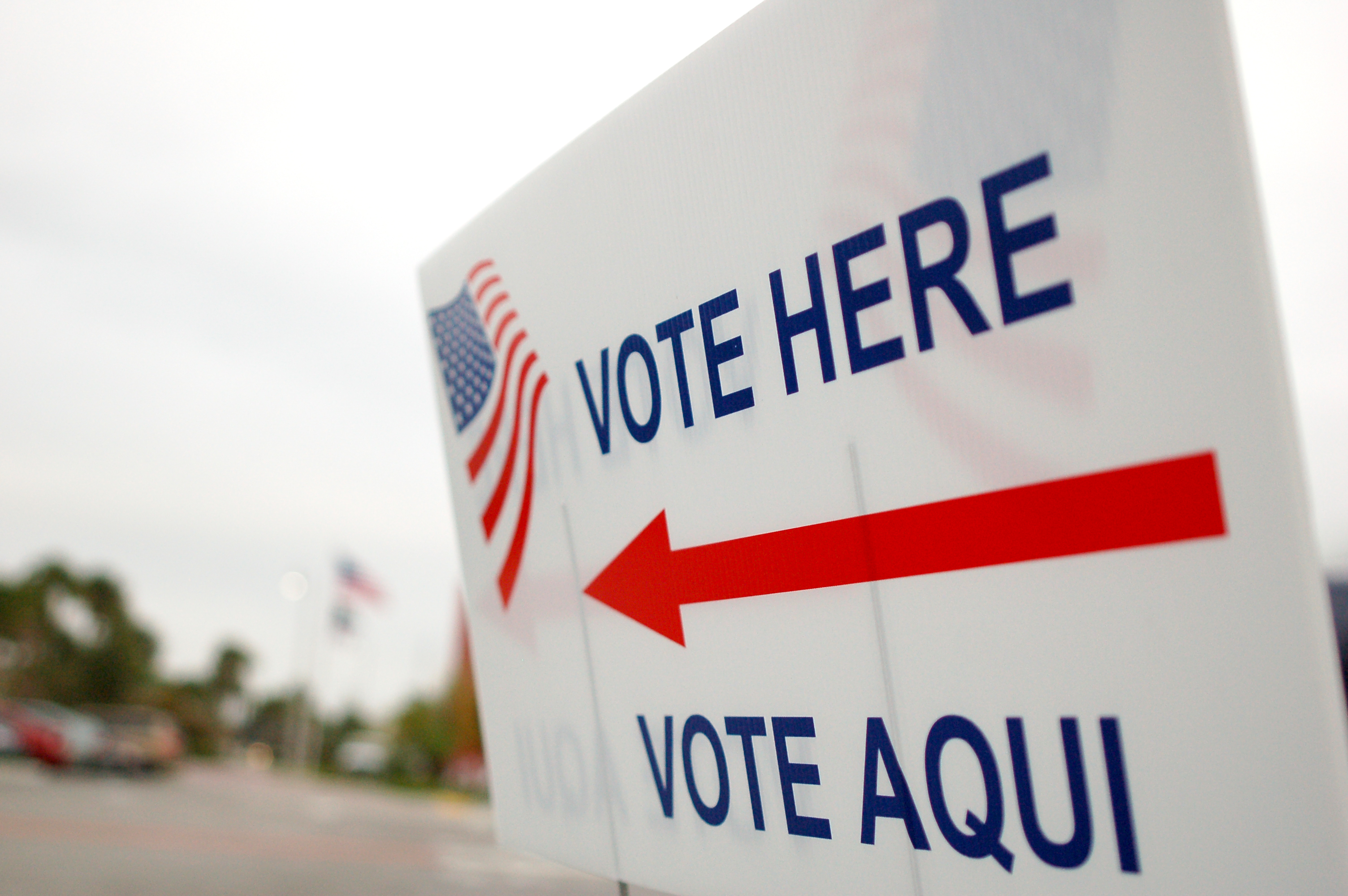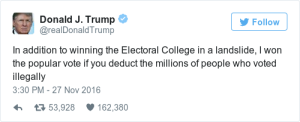Donald Trump and Voter Fraud

In his first official meeting on January 23rd, Donald Trump claimed that the only reason he lost the popular vote to Hillary Clinton was because of the votes of millions of illegal immigrants. Illegal voting has been a popular topic of Trump’s tweets, both during and after the election. However, there is no actual evidence to support Trump’s claim. While the strictness of what must presented at the polls vary across states, all states allow only citizens to register to vote.

Yet, Donald Trump is right in claiming that people may have voted illegally in other ways. One common problem that may lead to voter fraud is registration of voting in multiple states. Ironically, Trump’s daughter, Tiffany, along with other members of Trump’s inner circle, including his strategist Steve Bannon, his press secretary Sean Spicer, and his son-in-law Jared Kushner, are all double-registered. While double registration is typically not ill-intended, it is as much of a threat to voter fraud as illegal immigrant voting. Similarly, continued registration of deceased citizens may compromise voting legality. While both problems appear to present a massive obstacle to voter fraud, there is minimal evidence that either are used as tools for illegal voting. Often, voters simply forget to take themselves or deceased relatives off voter registrars. Both problems could be avoided by having a national registrar of voters that could identify discrepancies.
One barrier to voting that does not get significant attention is felon disenfranchisement. Felon disenfranchise affects 2.47% of all Americans, and a whopping 7.44% of all African Americans. The disfranchised population amounts to over 6 000 000 Americans, significantly more than the number of illegal immigrants Trump estimated to skew the presidential election. When compared to 45 other countries with similar levels of human rights as the US, only the US and three other countries (source) have restrictions on felon voting after release from prison. The laws on whether prisoners can vote during and after their sentences vary among states. While felons in Vermont and Maine can vote while in prison, eight states prohibit felons from voting at any point during or after their sentences. Voting is an important way for citizens to voice their opinion and feel like a member of a society. Thus, if prison’s purpose is not only as a form of punishment, but also as a form of rehabilitation, felons should at least have the chance to participate in voting after their release. Unfortunately, this legitimate problem fails to receive the same type of attention illegal immigrant voting does.
The case of illegal immigrant voting and greater voter fraud problems are a partisan issue. Historically, conservative support for barriers to voting can be seen in the difficulty of Southern African Americans to access ballots after the Civil War. While Republican support of stricter voting is not necessarily racist, the lasting legacies remain: minorities tend to vote Democrat. Stemming from this, many of the states that require or request photo IDs from voters (as compared to non-photo IDs) tend to vote Republican. In a poll by Mercyhurst University regarding Pennsylvania’s new photo voter-ID law, 90% of Republicans support the law, compared to only 31% of Democrats. Republican law-makers often support these new laws to combat the epidemic of voting fraud plaguing the US. However, considering voter fraud is not the problem Republican law-makers depict it as, it raises the question of whether or not they have other intentions. Photo voter-ID laws put many poorer Americans at a disadvantage. While Canadians may take photo ID’s for granted with provincial health cards, many lower income Americans do not possess passports, driver’s licenses, or similar government-issued photo IDs. Thus, like felon disenfranchisement, strict voter photo ID laws overwhelmingly affect minorities and lower-income Americans. While there may be some legitimate basis to stricter photo ID laws, policy-makers should really question whether the benefits will outweigh the consequences.
Another problem highlighted by false claims, like illegal voter fraud made by Trump and his administration, are an example of the fake news Trump so often criticizes. Although fake news has become a hot topic throughout and following the 2016 presidential election, it is not a new problem. As more and more attention is drawn towards fake news and discrepancies between left-leaning and right-wing news sources, readers struggle to decipher which news sources are reliable. Naturally, Trump, like every leader, should be held to a high standard when broadcasting news, and Americans should expect his claims to upheld by evidence. Voter fraud is just one of the many examples of Trump disseminating false claims to the American people. This is not to say that Trump is the first or only leader to spread fake news or make unverified claims. However, considering the increased attention to fake news and countless tools for fact-checking at the disposal of the American people, it is more difficult for these false claims to pass unnoticed.
